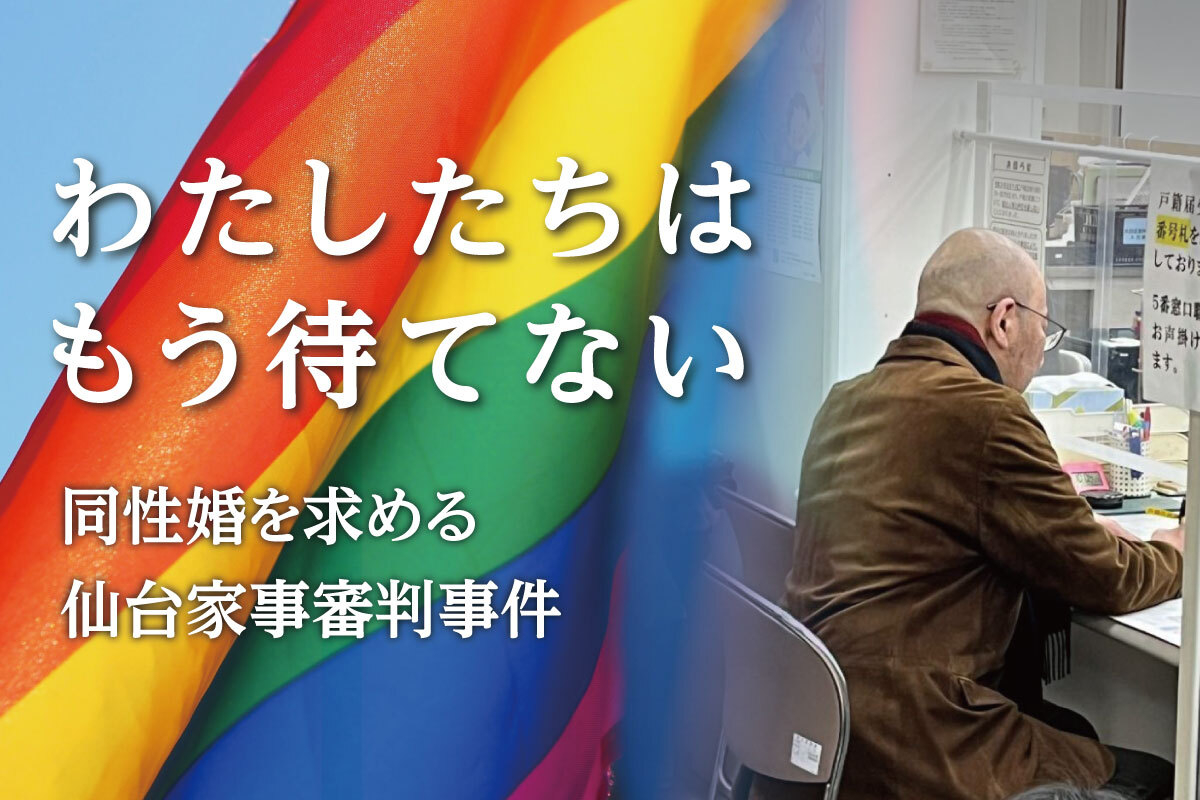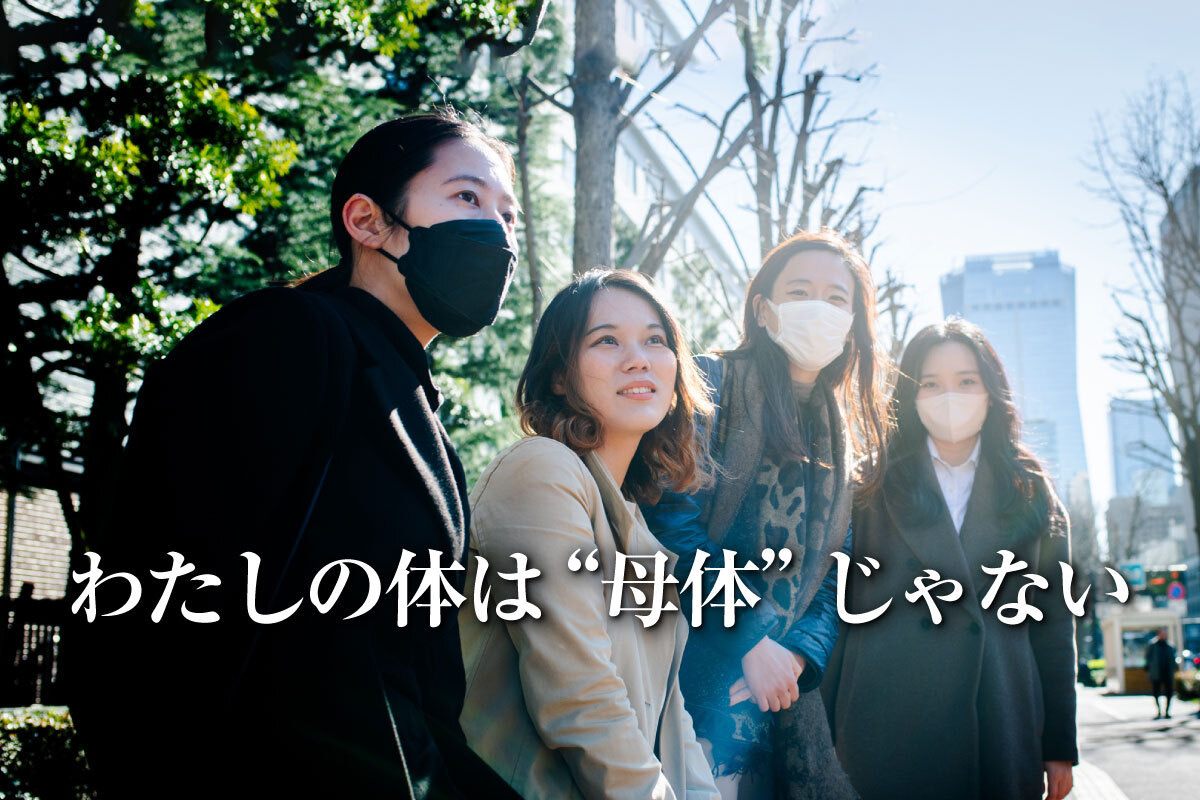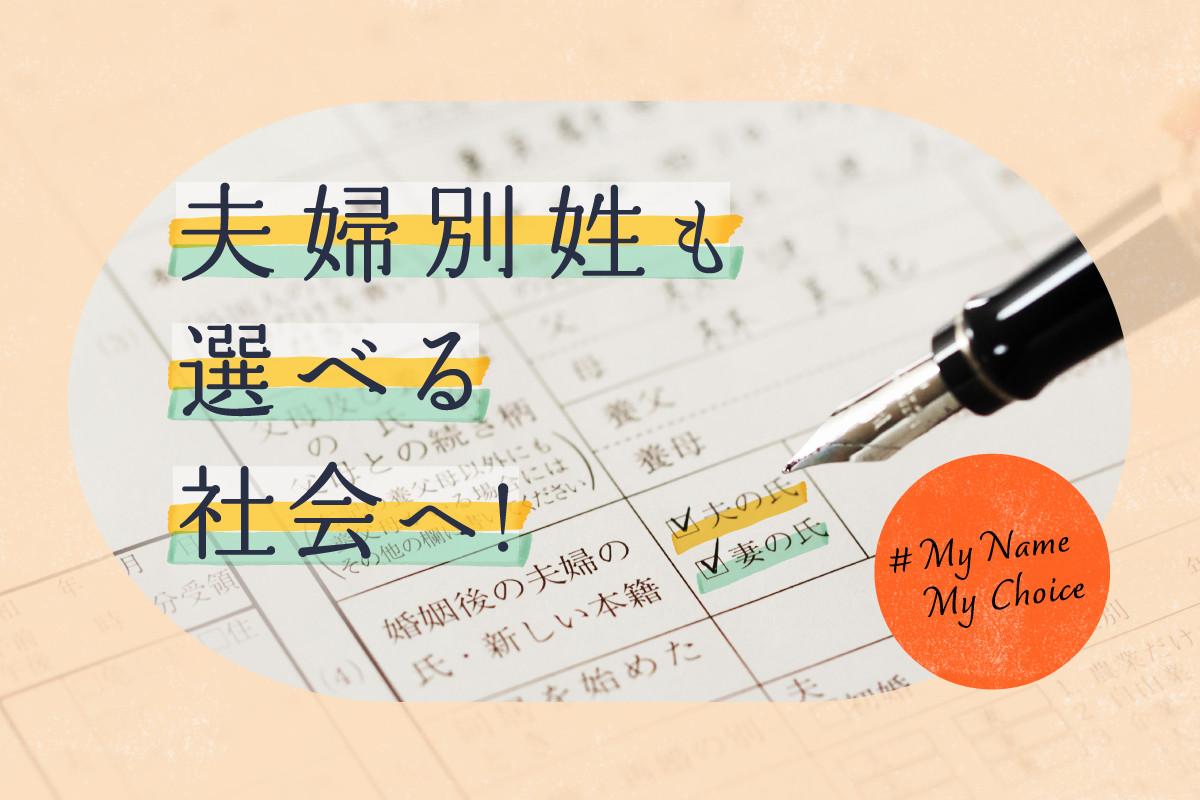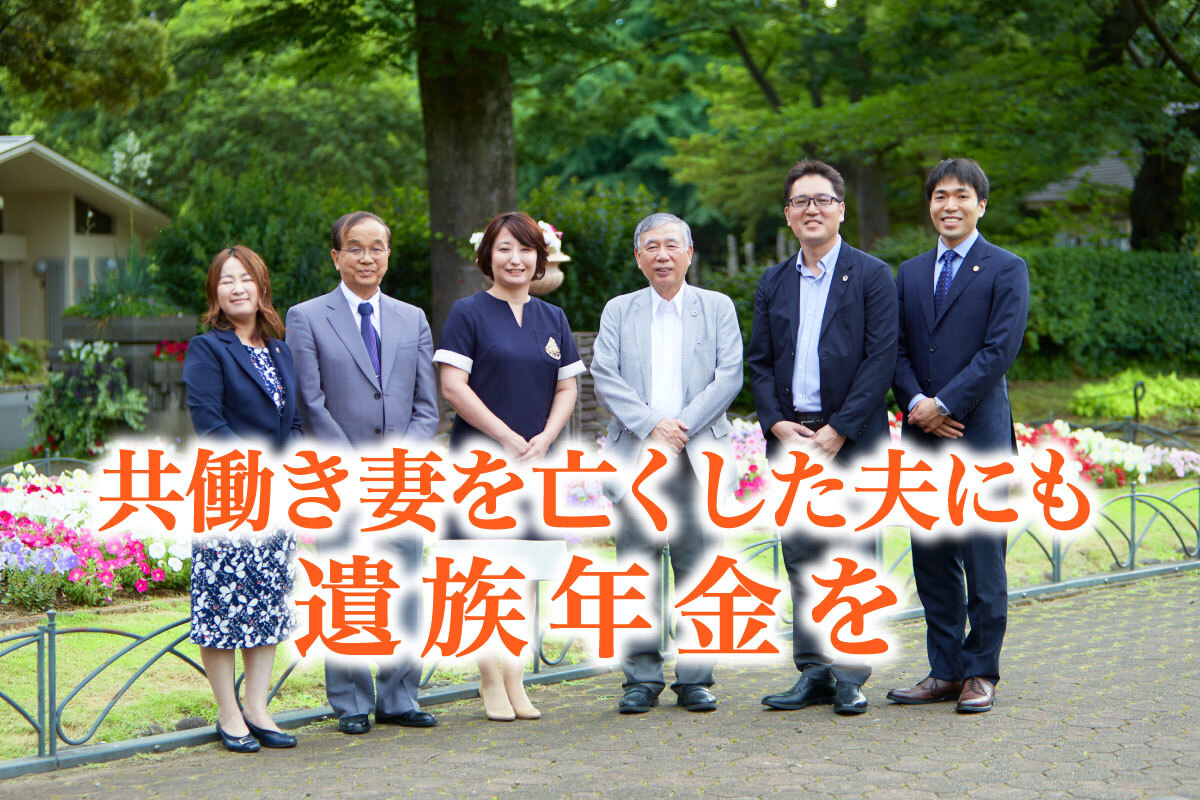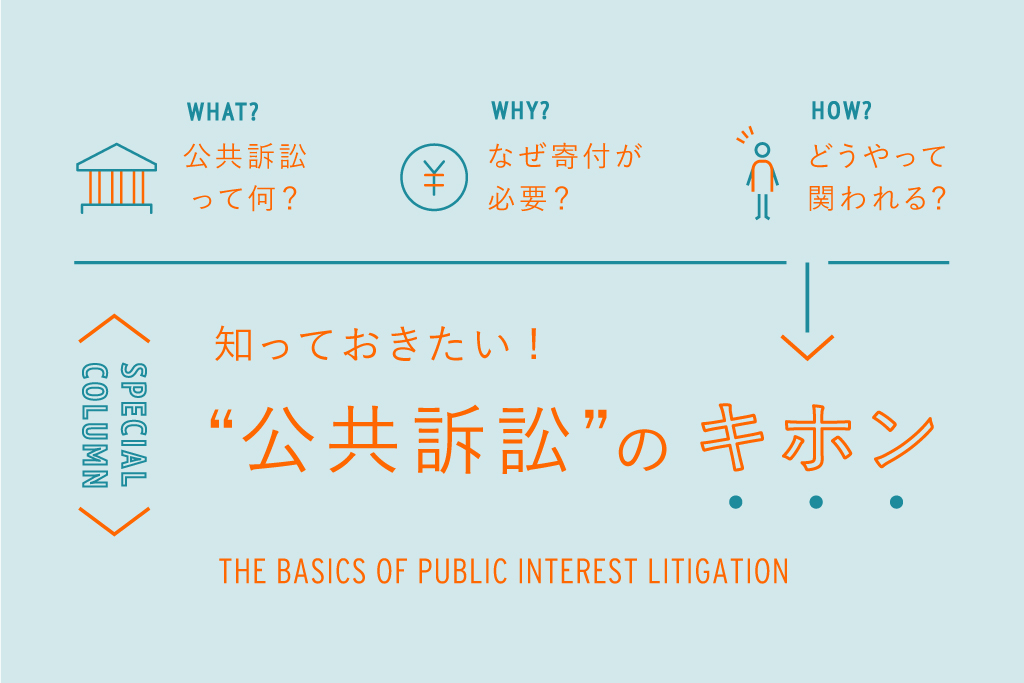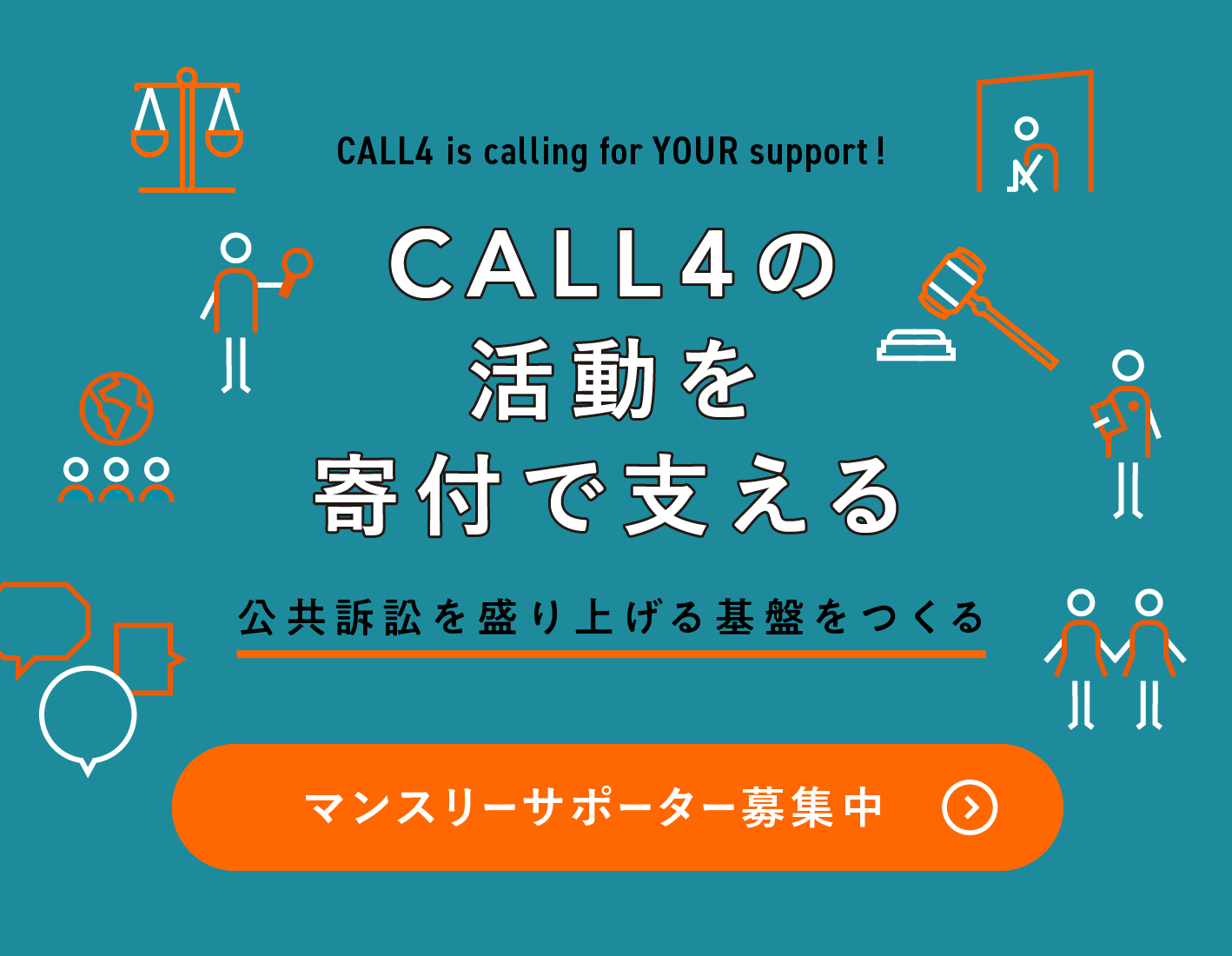既婚を理由に法的性別取扱い変更を認めないのは違憲!「なんでうちらが離婚せなあかんの?」裁判 Why We Have to Divorce? A Constitutional Challenge Against the Unmarried Status Requirement for Changing Legal Gender in Japan
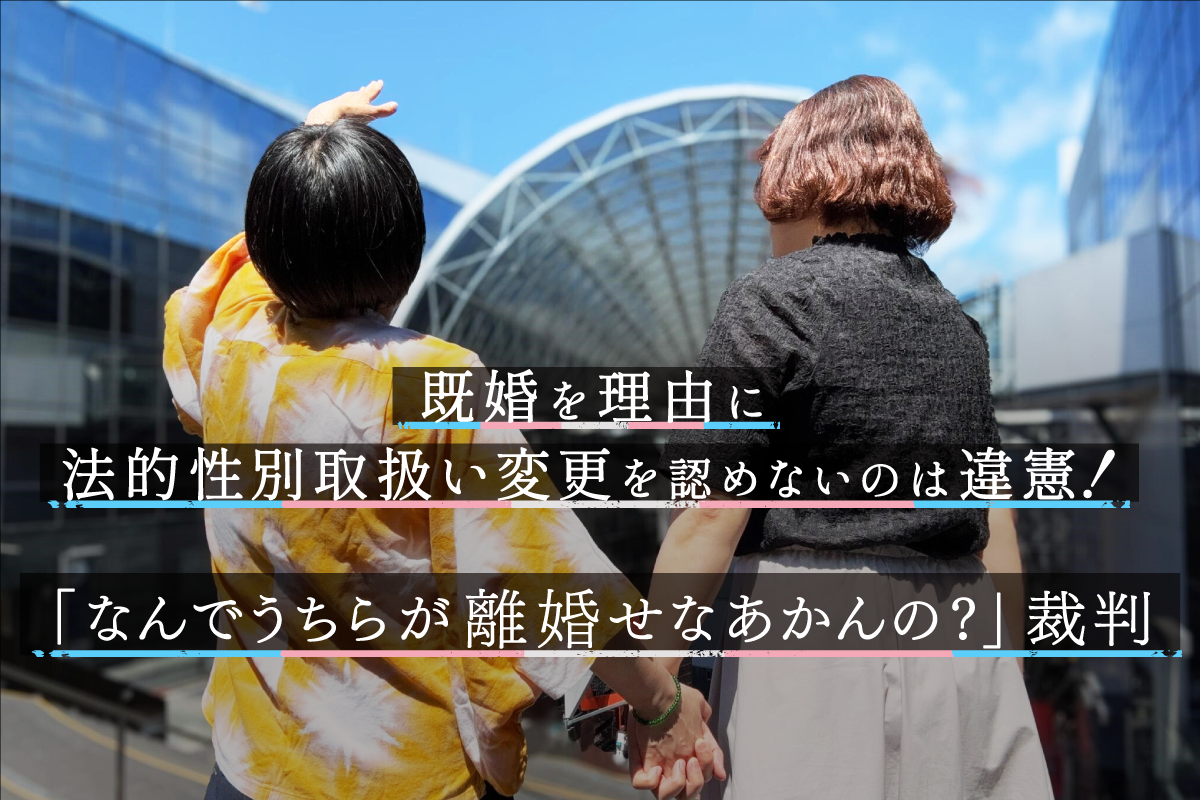
婚姻の平等(同性婚)が叶わないせいで困っているカップルは、現に法律上同性のカップルだけではありません。法的性別取扱い変更には、同性婚状態になるのを防ぐため、「現に婚姻をしていないこと」が求められています。法律上男女として結婚したトランスジェンダーは、「離婚する」か「実態に合わない性別取扱いのまま生きる」か、二者択一を迫られます。離婚を強制されることなく、性別取扱い変更を求めます。
This case challenges the constitutionality of the ”not being currently married” requirement (Art. 3, para. 1. item 2) in Act on Special Cases in Handling Gender Status for Persons with Gender Identity Disorder (”the Special Act”). The plaintiff (MtF transgender) who leads a perfect family life with the wife cannot bring the family registry in accordance with the actual living experience without getting divorce. This unveils the important question on whether it is reasonable to force people to divorce for changing legal gender.
はじめに
法律上は男女で、すでに結婚しているカップルのうち一方が性同一性障害者で性別取扱変更を希望するというカップルは、数は多くないものの、日本社会に暮らしています。この訴訟の申立人Aさんもその1人です。
トランスジェンダー女性である申立人Aさん。現在は女性として日常生活を送っています。
Aさんは、2015年、妻Bさんと結婚しました。
自分の性別違和について交際前からBさんに打ち明けており、結婚後、Bさんからの後押しもあって性別移行を進めました。Bさんには葛藤もあったそうですが、それでもAさんを後押ししてくれました。二人は今、女性どうしのカップルとして円満なふうふ関係を続けています。
Aさんは現在、周囲の人々から「女性」と認識されながら暮らしているのにもかかわらず、公的書類には「男性」と記載されています。この不利益を解消するため、法的性別取扱いの変更をするには、現在の法律では、Bさんと離婚しなければいけません。 Aさんは「Bさんと望まない離婚を事実上強制される」か「生活実態とあわない性別取扱いのために都度望まないカミングアウトを強制され、あるいは本人確認すらままならない」か、過酷な二者択一を迫られています。本ケースは、離婚によらず法的性別取扱の変更ができるよう、求めるものです。
申立ての概要
申立人Aさんは、Bさんと離婚することなく、『戸籍上の性別を「男」から「女」へ』変更を求める申立てを行います。
申立人Aさんについて
申立人Aさんは、京都府在住のトランスジェンダーの女性(50代)です。女性として日常生活を送り、法律上の名前も女性名に変更しています。他方、出生時に割り当てられた法律上の性別は男性で、今も、戸籍や身分証明書、公的書類には「男性」と記載されています。
Aさんは、日常的に女性として社会生活をおくり、周囲の人々からも女性として認識されています。そのため、本人確認が必要な手続きや性別欄のある公的書類が必要になる手続きをする際、他者からは困惑のまなざしを向けられます。
-「どうして女性が『男性』と書かれた身分証明書を持っているのだろう?」
-「夫の書類を代わりに妻が持ってきたのか?」
Aさんは、そのたびに丁寧に事情を説明する必要に迫られ、望まないカミングアウト(トランスジェンダーであることの開示)を迫られます。
なんでうちらが離婚せなあかんの?
Aさんは、「性同一性障害者の性別の取扱いの特例に関する法律」(以下「特例法」といいます。)に定める各要件のうち、同法第3条1項2号に定める「現に婚姻をしていないこと」(いわゆる「非婚要件」)以外、すべての要件を満たしています。
つまり、Bさんと離婚さえすれば、すべての要件を満たし、「女性」として法的取扱いを受けられます。非婚要件は、Aさんに対し、「Bさんと離婚して、女性として、社会生活実態に合った法令上の性別取扱いを受ける」か、「Bさんとの婚姻関係を維持して、法令上男性と扱われ続ける」か、いずれかの選択を迫っています。
AさんもBさんも、離婚は希望していません。二人にとってお互いが大事なパートナーです。二人のかけがえのない日々を安心して続けていくうえで、婚姻制度によって関係が法的に保護されていることは大事な支えになっています。
そこで、Aさんは、非婚要件の違憲性を前提として女性としての社会生活実態に合った法令上の性別取扱いを受けることを求め、裁判を始めることにしました。
「なんでうちらが離婚せなあかんの?」というのは、AさんBさん二人の思いです。
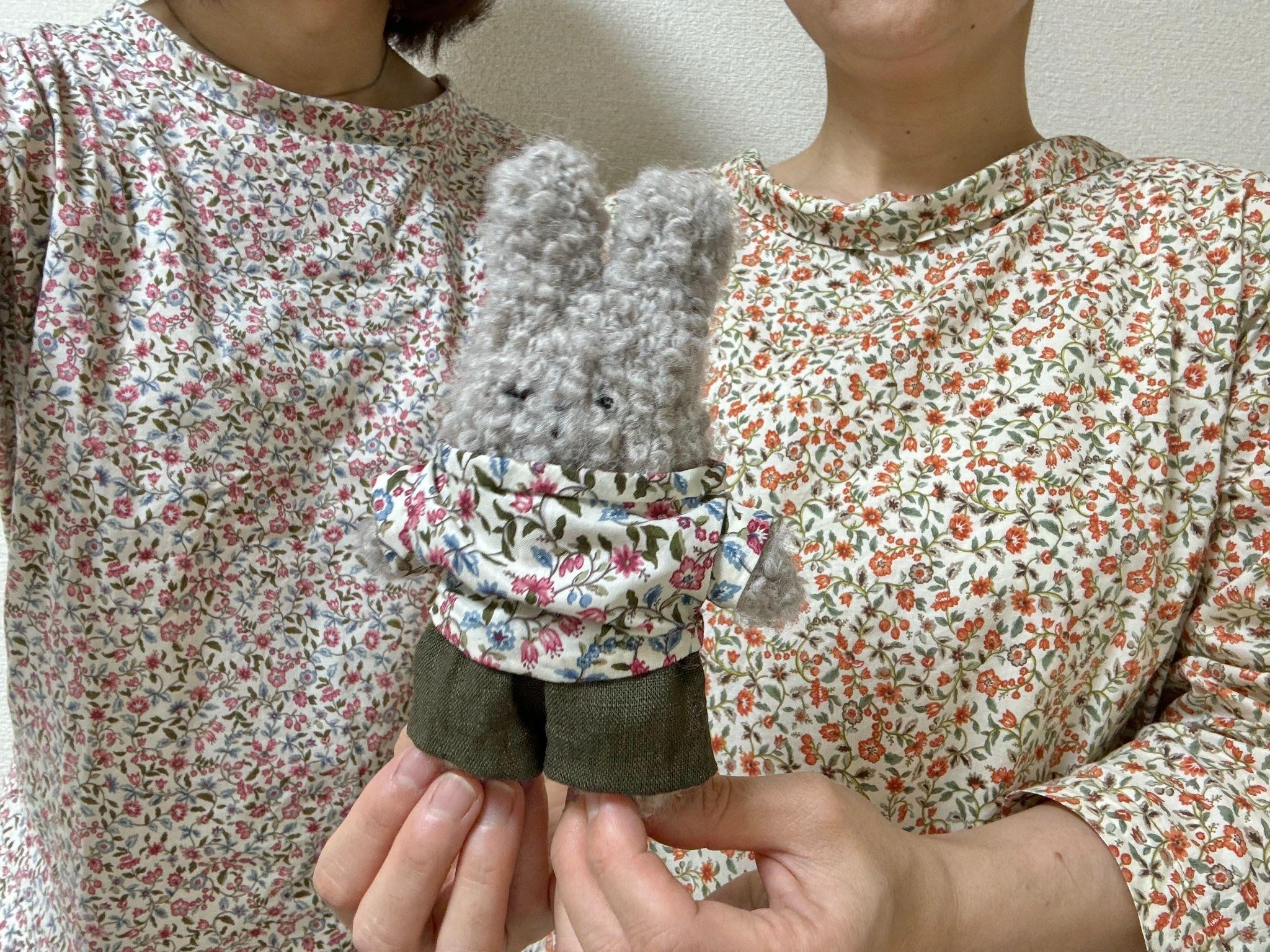
申立ての争点
Aさんが求めるもの
Aさんの性別取扱いを「男性」から「女性」に変更する
性別取扱い変更の要件
法令上の性別を変更するための要件は、特例法で定められています。
また、憲法24条1項は、結婚をすることについての自由かつ平等な意思決定を保障しているといえます。
第三条 家庭裁判所は、性同一性障害者であって次の各号のいずれにも該当するものについて、その者の請求により、性別の取扱いの変更の審判をすることができる。
一 十八歳以上であること。
二 現に婚姻をしていないこと。
三 現に未成年の子がいないこと。
四 生殖腺がないこと又は生殖腺の機能を永続的に欠く状態にあること。
五 その身体について他の性別に係る身体の性器に係る部分に近似する外観を備えていること。
2 前項の請求をするには、同項の性同一性障害者に係る前条の診断の結果並びに治療の経過及び結果その他の厚生労働省令で定める事項が記載された医師の診断書を提出しなければならない。
これらの要件を満たす場合に、家庭裁判所は性別の取扱いの変更を認めます。
※4号要件については、2023年10月25日の最高裁決定により、違憲無効であると判断されたため、現在は、どの裁判所でも4号要件をみたす必要はなくなりました。
裁判所に求める憲法判断
特例法3条1項2号は、「現に婚姻していないこと」という要件を定めています。
つまり、「結婚している性同一性障害者のトランスジェンダーは離婚しなければ、法的性別取扱い変更ができない」という条件を課しています。
非婚要件は憲法に違反し無効なので、この要件を満たしていなくても(Bさんと結婚したままでも)、Aさんの性別取扱い変更を認めるという判断を裁判所に求めます。
非婚要件が人権侵害である理由
⑴ 「同性婚状態を防ぐ」目的であること
非婚要件がつくられた目的は「同性婚状態を防ぐ」ことです。
AさんがBさんとの婚姻関係を継続したまま法令上の性別取扱いの変更を行うと、AさんとBさんは、法律上女性同士の婚姻関係となりますが、婚姻している同性カップルの誕生を防ぐために離婚を求めるという要件なのです。
⑵ 実質的に離婚を望まないカップルに離婚を強いていること
離婚を望まないカップルに離婚を実質的に強いるのは、人権侵害です。
わたしたちは、非婚要件が憲法13条及び24条に反し違憲無効であると主張しています。
性自認や生活実態に沿った性別取扱いを受けることは、憲法13条で保障されている人権です。この権利の重要性は、今まで他の性別取扱変更要件の人権侵害性が争点となった他の裁判の中でも確認されてきました。
そして、離婚を望んでいないカップルに離婚を強いられないことも、憲法13条、24条によって保障されている人権です。憲法24条は、結婚するかしないかという選択が両当事者の合意のみに委ねられていて、他者や公権力が介入したり干渉してはいけないことを定めています。既に婚姻して円満にふうふ関係を続けている二人が、法律によって離婚を強いられないということも、憲法24条・13条で保障されているというべきです。
憲法上保障された人権が天秤にかけられ、一方をとればもう一方は叶わない…Aさんはそんな状況に置かれています。
⑶ 「同性婚状態を防ぐため」は理由にならないこと
非婚要件の存在理由である「同性婚状態を防ぐ」という目的には、今や正当性はありません。
確かに、今、法律上同性どうしのカップルは婚姻できません。ですが、婚姻の平等を求める「結婚の自由をすべての人に訴訟」で積み上げられた判決は、「法律上同性のカップルが婚姻制度による利益を受けられない状態にあること、関係を公証したり保護するための制度が何もない状態に置かれていること」を憲法違反であることを明確にしました。
婚姻関係の継続を望むAさんBさんに離婚を強いることで「同性カップルが結婚できない現状」に合わせるのではなく、憲法違反である現状を変えるべきです。
社会的意義
法律上は男女で、既に結婚しているカップルのうち一方が性同一性障害者で性別取扱変更を希望するというカップルは、数は多くないものの、AさんBさんカップル以外にも日本社会に暮らしています。他のカップルたちも同じように過酷な二者択一を迫られています。
一方で、本ケースは、未婚のカップルたちが求める婚姻の平等の実現、いわゆる同性婚法制化とは人生における局面や法的な位置づけは異なるものの、どちらも「結婚の自由」の権利に根ざしていることに変わりはありません。双方のケースが互いに影響を与えながら、多面的なアプローチで一日も早い「結婚の自由」「婚姻の平等」の実現、立法措置に近づけることと信じています。
申立日である2024年7月16日は、特例法施行から20周年です。特例法の他の要件についても人権侵害の指摘が国内外から上がる今、トランスジェンダーが直面する他の人権課題解決の一助になればと願っています。

資金の使途
皆さまから頂戴したご支援は、弁護士費用を除く訴訟の費用(印紙代、コピー代、交通費、意見書依頼費等)や、社会や立法へ働きかけをしていくためのキャンペーン費用にあてられます。弁護士費用にはなりません。
皆さまから多大なご支援をいただき、万が一ご支援金が余った場合には、当事者支援のための団体に寄付いたします。
申立人の思い
申立人Aさん
私は、内面が女性であることを理解してくれた妻と結婚し、これまで9年間、お互い助け合い補い合いながら、円満な家族関係を築いてきました。
一方で、妻の後押しを受けて、数年前から性別を移行するための努力を重ね、現在では社会のあらゆる場面で、女性として認識されて生活しています。
しかし、法制度上、婚姻中は「身分証の性別」を「女性」に変更することができません。
このため、身分証を提示するたびに自分のセクシュアリティについて説明が必要になり、「望まぬカミングアウト」をせざるを得ず、とても苦しい思いをしています。
この問題を解消するには、妻と「離婚」をせざるを得ず、長年築いてきた家族関係が不安定なものとなり、私だけでなく、妻にとっても重大な不利益になります。
本訴訟で問題としている、性同一性障害特例法3条1項2号の「非婚要件」の存在理由は「(婚姻中の法的な性別取扱いの変更を)認めると同性婚状態になるから」という説明がなされてきていますが、言い換えれば事実上「マジョリティであるシスジェンダーの同性愛者が救われるまで待て、マイノリティはわきまえてろ」と言っていることに等しいのです。しかしドイツでは、同性婚が認められる10年近く前に「非婚要件」の撤廃が行われました。同性婚が認められない限りこの「身分証の性別の変更」か「婚姻関係の維持」かのどちらかしか選択できない現状を解消するため、裁判をすることを決意しました。
どうぞご支援くださいますよう、お願いいたします。
申立人Aさんの妻
私たちがふうふとして家族として過ごしてきた時間、楽しいことも、腹立つことも過ごした時間はかけがえのないものです。
それは、どの家族でも同じことだと思います。
それぞれの事情で別れを選ぶ場合もありますが、私たちは望んでいません。
今までと同じ暮らしを望むことが、なぜいけないのでしょうか。

担当弁護士のメッセージ
あらゆる人が個人として尊重され、個人の生命や人格は等しく保障されなければならないというのが憲法の根本的な理念(憲法価値)です。性別についての認識は、人格の核心に関わるものであり、その性自認のとおりの性別を尊重される権利は、憲法13条の幸福追求権の保障する人格権の一内容として保障されるものです。
性自認と異なる性で扱われることは、それ自体とても苦痛です。また、外見上の性別と法令上の性別が異なることが公的書類を通して第三者に明らかになることで、意に沿わないカミングアウトを迫られてしまい、ハラスメントや差別、偏見の対象とされる危険も生じます。
性のあり方は多様で、誰からも強制されません。どのような性のあり方であっても、ありのままの自分で生きていくことに怯えなくてよい社会になりますように。
その実現のため、私たちはこの裁判に取り組みます。
弁護団の紹介
水谷 陽子(愛知県弁護士会)
堀江 哲史(愛知県弁護士会)
本多 広高(東京弁護士会)
皆川 洋美(札幌弁護士会)
仲 晃生(京都弁護士会)
壽 彩子(京都弁護士会)
向井 香織(第二東京弁護士会)
おわりに
婚姻関係にありたいカップルが性のあり方を理由に差別を受けないこと、そして、ジェンダーアイデンティティーと生活実態に沿った法令上の性別取扱いを受けスムーズに生活できること、それらが両立する法制度の実現を望みます。
性のあり方にかかわらず、すべての人が自分らしく生きられるように、そして、自分らしく生きる選択のために何かを犠牲にすることがないように、「うちら裁判」のご支援をどうぞよろしくお願いいたします。
*Translated by Google translate
Introduction
Although they are not many, couples in Japanese society exist in which one person in a married couple who is legally a man and a woman has gender identity disorder and wishes to change their gender status. The plaintiff in this lawsuit, Ms. A, is one of them.
Applicant A is a transgender woman who currently lives her daily life as a woman.
Mr. A married his wife, Ms. B, in 2015.
A had been open about her gender dysphoria to B before they started dating, and after they got married, she went ahead with her gender transition with B's encouragement. B says she had some conflicts, but she still supported A. The two now live happily together as a lesbian couple.
Although Ms. A is currently living her life being recognized as a "woman" by those around her, her official documents state she is a "man." Under current law, in order to change her legal gender status to eliminate this disadvantage, she must divorce Ms. B. Ms. A is faced with a harsh choice between being "effectively forced into an unwanted divorce from Ms. B" or "being forced to come out against her will each time because her gender status does not match her actual lifestyle, or even being unable to even confirm her identity." This case is a request to allow her legal gender status to be changed without divorce.
Summary of the complaint
Petitioner A files a petition requesting that his/her gender on the family register be changed from "male" to "female" without divorcing Ms. B.
Regarding Applicant A
The petitioner, Ms. A, is a transgender woman (in her fifties) living in Kyoto Prefecture. She lives her daily life as a woman and has legally changed her name to a female name. However, the legal sex assigned to her at birth was male, and even now she is listed as "male" on her family register, identification card, and other official documents.
Ms. A lives her daily social life as a woman and is recognized as a woman by those around her. Therefore, when she goes through procedures that require identity verification or official documents with a gender field, others look at her with confusion.
- "Why does a woman have an ID that says 'male'?"
- "Did the wife bring the documents for her husband?"
Each time this happens, Ms. A is forced to carefully explain the situation, and is pressured into coming out (disclosing that she is transgender) despite her wishes.
Why do we have to get divorced?
Ms. A meets all of the requirements set out in the Act on Special Cases for the Treatment of Gender Identity Disorder (hereinafter referred to as the "Special Cases Act") except for the requirement in Article 3, Paragraph 1, Item 2 of the Act that she is "not currently married" (the so-called "non-married requirement").
In other words, if A simply divorces B, all the requirements will be met and she will be legally treated as a "woman." The non-marriage requirement forces A to choose between divorcing B and being treated as a woman under the law in accordance with her actual social circumstances, or maintaining her marriage with B and continuing to be treated as a man under the law.
Neither A nor B wish to divorce. They are both important partners to each other. The fact that their relationship is legally protected by the marriage system is an important support for them as they continue to spend their irreplaceable days together with peace of mind.
Therefore, Ms. A decided to start a lawsuit, seeking to be treated according to the law based on her gender, in line with her actual social life as a woman, based on the premise that the non-marriage requirement is unconstitutional.
"Why do we have to get divorced?" is what both Mr. A and Mr. B are thinking.

Issues in the petition
What A wants
Change A's gender status from "male" to "female"
Requirements for changing gender status
The requirements for changing your legal gender are set out in the Special Cases Act.
Furthermore, Article 24, paragraph 1 of the Constitution can be said to guarantee free and equal decision-making regarding marriage.
Article 3 A family court may, at the request of an individual with gender identity disorder who falls under any of the following items, make a ruling to change the gender status of that individual:
1. Be 18 years of age or older.
(ii) You are not currently married.
3. You do not currently have any minor children.
4. The absence of gonads or a permanent lack of gonad function.
5. That person's body has an appearance similar to the genital parts of the body of the other sex.
2. To make a claim under the preceding paragraph, a doctor's certificate must be submitted that sets forth the results of the diagnosis under the preceding Article for the person with gender identity disorder, as well as the progress and results of treatment, and other matters specified by Ministry of Health, Labour and Welfare Ordinance.
If these requirements are met, the family court will approve a change in gender status.
*As a result of a Supreme Court decision on October 25, 2023, which determined that requirement No. 4 was unconstitutional and invalid, it is no longer necessary for any court to meet requirement No. 4.
Constitutional ruling requested by the court
Article 3, Paragraph 1, Item 2 of the Special Act stipulates the requirement that "the person is not currently married."
In other words, it imposes the condition that "married transgender people with gender identity disorder cannot change their legal gender status unless they divorce."
Because the non-marriage requirement violates the Constitution and is invalid, we will ask the court to rule in favor of recognizing Mr. A's change of gender status even if he does not meet this requirement (even if he remains married to Ms. B).
Why non-marriage requirements are a violation of human rights
(1) The purpose is to "prevent same-sex marriages"
The purpose of the non-marriage requirement is to "prevent same-sex marriages."
If Person A changes their legal gender status while continuing their marriage to Person B, Person A and Person B will be legally married to each other as women, but the requirement to seek a divorce is in order to prevent the creation of married same-sex couples.
(2) Forcing divorce on couples who do not actually want to divorce
Effectively forcing divorce on couples who do not wish to divorce is a violation of human rights.
We argue that the non-marriage requirement is unconstitutional and invalid, as it violates Articles 13 and 24 of the Constitution.
Being treated according to one's gender identity and living circumstances is a human right guaranteed by Article 13 of the Constitution. The importance of this right has been confirmed in other court cases in which the human rights violations of other gender status change requirements were at issue.
Furthermore, the right of couples who do not wish to divorce not to be forced to do so is guaranteed by Articles 13 and 24 of the Constitution. Article 24 of the Constitution stipulates that the choice of whether or not to marry is left solely to the mutual agreement of both parties, and that no other person or public authority may intervene or interfere in the decision. It can be said that Articles 24 and 13 of the Constitution also guarantee that couples who are already married and enjoying a happy relationship will not be forced by law to divorce.
Mr. A finds himself in a situation where his constitutionally guaranteed human rights are being weighed against one another, and choosing one means giving up the other.
3) “Preventing same-sex marriage” is not a valid reason
The purpose of the non-marriage requirement, which is to "prevent same-sex marriages," no longer has any legitimacy.
It is true that same-sex couples cannot legally marry at present. However, the accumulated court decisions in the Freedom to Marry Lawsuit, which seeks marriage equality, have made it clear that it is unconstitutional for same-sex couples to be denied the benefits of the marriage system and to be left in a situation where there is no system in place to legally notify or protect their relationship.
Rather than conforming to the "current situation where same-sex couples cannot marry" by forcing divorce on Mr. A and Mr. B, who wish to continue their marriage, we should change the current situation, which violates the Constitution.
Social significance
Although there are not many couples who are legally married but one of them has gender identity disorder and wishes to change their gender status, there are others living in Japanese society besides Mr. and Mr. B. Other couples are being forced to make the same harsh choice.
On the other hand, although this case is different from the realization of marriage equality sought by unmarried couples, or the legalization of so-called same-sex marriage, in terms of the life circumstances and legal status, both are rooted in the right to "freedom of marriage." I believe that by taking a multifaceted approach, both cases will influence each other and bring us closer to the realization of "freedom of marriage" and "marriage equality" and to legislative measures as soon as possible.
The petition date, July 16, 2024, will be the 20th anniversary of the enforcement of the Special Cases Act. Now that other requirements of the Special Cases Act have been pointed out as violating human rights both domestically and internationally, we hope that this petition will help resolve other human rights issues faced by transgender people.

Use of funds
Your donations will be used to cover litigation costs (excluding attorney's fees, such as stamps, copying, transportation, and fees for requesting written opinions) and campaign costs to influence society and legislation. They will not cover attorney's fees.
We appreciate your generous support, and if we have any money left over, we will donate it to organizations that support those affected.
The applicant's thoughts
Applicant A
I married my wife, who understood that I am a woman inside, and for the past nine years we have built a harmonious family relationship, helping and complementing each other.
On the other hand, with the support of his wife, he has been working hard to transition since several years ago, and now lives his life recognized as a woman in all aspects of society.
However, under the legal system, you cannot change the "gender on your identification card" to "female" while married.
Because of this, every time I present my identification I have to explain my sexuality, which forces me to "come out unwillingly," causing me great distress.
To resolve this problem, I would have no choice but to "divorce" my wife, which would destabilize the family relationship we have built up over the years and cause serious disadvantages not only to me but also to my wife.
The reason for the existence of the "non-marriage requirement" in Article 3, Paragraph 1, Item 2 of the Gender Identity Disorder Special Cases Act, which is the issue in this lawsuit, has been explained as being "because if (changing legal gender status during marriage) is approved, it will result in a same-sex marriage," but in other words, this is essentially the same as saying, "Wait until cisgender homosexuals, who are the majority, are saved, and minorities should know better." However, in Germany, the "non-marriage requirement" was abolished nearly 10 years before same-sex marriage was recognized. We decided to take the case to court in order to end the current situation in which people can only choose between "changing the gender on their ID" or "maintaining their marriage" unless same-sex marriage is recognized.
We would appreciate your continued support.
Applicant A's wife
The time we've spent together as a couple, the fun times and the frustrating times we've had together, are irreplaceable.
I think it's the same for every family.
While some people may choose to separate for their own reasons, this is not something we want.
Why is it wrong to want to continue living the same way as before?

Message from the lawyer in charge
The fundamental principle of the Constitution (constitutional values) is that all people should be respected as individuals, and that the life and personality of each individual should be equally protected. Gender awareness is at the core of one's personality, and the right to have one's gender identity respected is guaranteed as part of the personal rights guaranteed by Article 13 of the Constitution, which guarantees the right to pursue happiness.
Being treated as a gender that differs from one's gender identity is itself extremely painful. Furthermore, if a third party learns through official documents that one's outward appearance and legal gender are different, one may be forced to come out against one's will, and may be at risk of being subjected to harassment, discrimination, and prejudice.
Sexuality is diverse and no one can force you to be sexual. I hope that we can create a society where no one has to be afraid to live as they are, whatever their sexuality.
We are taking this case to court to achieve that goal.
Introducing the Lawyers
Yoko Mizutani (Aichi Bar Association)
Satoshi Horie (Aichi Prefecture Bar Association)
Hirotaka Honda (Tokyo Bar Association)
Hiromi Minagawa (Sapporo Bar Association)
Akio Naka (Kyoto Bar Association)
Ayako Kotobuki (Kyoto Bar Association)
Kaori Mukai (Tokyo Bar Association)
in conclusion
We hope to see a legal system that allows couples who wish to marry to not be discriminated against on the basis of their sexuality, and to be able to live smoothly together with their gender identity and actual lifestyle being treated according to the law.
We ask for your support in our lawsuit so that everyone can live as they are, regardless of their sexuality, and so that they do not have to sacrifice anything in order to choose to live as they are.
<連絡先>
〒460-0002
名古屋市中区丸の内三丁目20番22号
桜通大津中駒ビル203号室
ミッレ・フォーリエ法律事務所
弁護士 水谷 陽子
TEL 052-961-3810 FAX 052-308-1561
Email: uchira.no.saiban@gmail .com
あなたにおすすめのケース Recommended case for you
- 外国にルーツを持つ人々 Immigrants/Refugees/Foreign residents in Japan
- ジェンダー・セクシュアリティ Gender/Sexuality
- 医療・福祉・障がい Healthcare/Welfare/Disability
- 働き方 Labor Rights
- 刑事司法 Criminal Justice
- 公正な手続 Procedural Justice
- 情報公開 Information Disclosure
- 政治参加・表現の自由 Democracy/Freedom of Expression
- 環境・災害 Environment/Natural Disasters
- 沖縄 Okinawa
- 個人情報・プライバシー Personal information/Privacy
- アーカイブ Archive
- 全てのケース ALL
